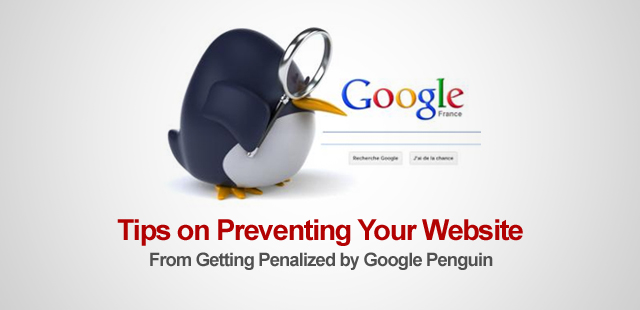
There is nothing more frustrating for a business owner than discovering that his/her traffic has plummeted due to being penalized from Google. For many people, web traffic is the lifeblood of their business. Here are a few tips on how to help prevent your website from getting penalized from Google Penguin.
Say 'No' to Spammy Guest Blogging?
Earlier this year, Matt Cutts, the head of Google's Webspam team declared that guest blogging should be avoided -- unless you’re willing to "vouch" for someone you know personally. Why has guest blogging gotten such a bad rap lately? Google frowns upon guest blogging because it has become a cesspool filled with spammy content. People were posting blog articles just to get backlinks and not to benefit the readers. It got out of hand and Google decided to penalize anyone with unnatural links.
If you’re still considering guest blogging, make sure you diversify your content marketing campaign with other elements, such as social media marketing, video marketing, etc. You don’t want to focus all of your attention on guest blogging.
Never Buy Links from Linkbuilding Firms
Avoid any kind of linkbuilding service that tries to manipulate a website’s ranking. This type of paid for link building service is a scheme that should be avoided at all costs. Google also frowns upon paying for links. Your link profile should look natural as possible. When it comes to linkbuilding, make sure your SEO consultant follows Google’s rules guidelines. Otherwise, you could run the risk of getting penalized or worse - your website could be taken off the map (banned from Google).
Don’t Post Duplicate Content
Google has made it a duty to penalize any website that contains duplicate content. Make sure that all of the web content on your website is 100% original. If you have a writing team or staff member creating content for you, it won’t hurt to run your content through a plagiarism program like Copyscape. This will detect whether your content has been copied and pasted. You can also detect if any of your competitors have ripped off your content.
Avoid Irrelevant Keywords and Keyword Stuffing
Most SEO consultants are aware of Google’s rule against keyword stuffing within content. Keywords should only be placed within your content 2-3 times. It also helps to use variations of keywords. It is also important that your Meta Descriptions do not contain more than one of the same keyword. Also, make sure your keywords are relevant to your content. Google loves content that utilizes keywords that are relevant to readers.
Are you concerned that your website may get penalized in the future? If so, talk to a professional SEO consultant so he/she can conduct an analysis to make sure your website is following Google’s guidelines.
For more information on our web development and SEO services, contact us today for a consultation at: 866.213.2352.